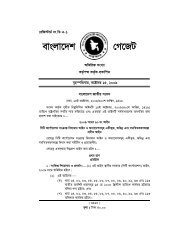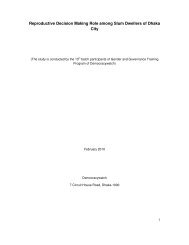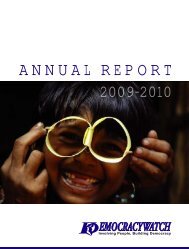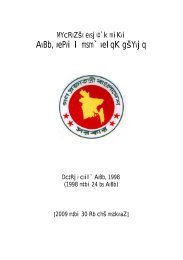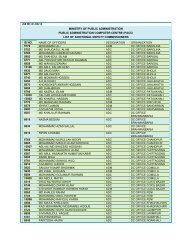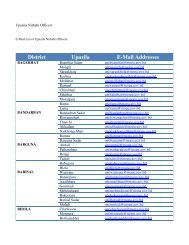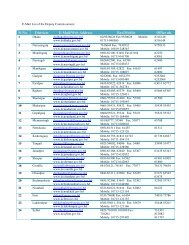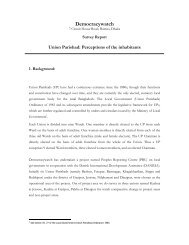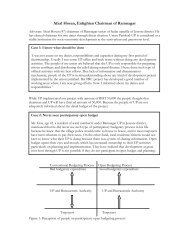Safeguarding the rights of domestic workers: Existing laws and ways ...
Safeguarding the rights of domestic workers: Existing laws and ways ...
Safeguarding the rights of domestic workers: Existing laws and ways ...
Create successful ePaper yourself
Turn your PDF publications into a flip-book with our unique Google optimized e-Paper software.
accordance with <strong>the</strong> law, <strong>and</strong> only in accordance with <strong>the</strong> law, is <strong>the</strong> inalienable right <strong>of</strong> every<br />
citizen. No action detrimental to <strong>the</strong> life, liberty, body, reputation or property <strong>of</strong> any person<br />
shall be taken except in accordance with <strong>the</strong> law. Article 32 guarantees right to life <strong>and</strong><br />
personal liberty. Article 34 prohibits all forms <strong>of</strong> forced labour. Article 36 guarantees<br />
freedom <strong>of</strong> movement. Article 37 declares freedom <strong>of</strong> assembly. Article 38 is also very<br />
relevant as it says that every citizen shall have <strong>the</strong> right to form associations <strong>of</strong> unions.<br />
Article 39 safeguards freedom <strong>of</strong> thought, conscience <strong>and</strong> speech. Article 41 guarantees<br />
freedom <strong>of</strong> religion. Article 43 declares, among o<strong>the</strong>r things, privacy <strong>of</strong> correspondence <strong>and</strong><br />
communication.<br />
In case <strong>of</strong> violation <strong>of</strong> any <strong>of</strong> <strong>the</strong> Fundamental Rights, which are to be interpreted in <strong>the</strong> light<br />
<strong>of</strong> <strong>the</strong> Preamble <strong>and</strong> <strong>the</strong> Fundamental Principles, <strong>the</strong> aggrieved person can file a writ petition<br />
before <strong>the</strong> High Court Division. Apart from <strong>the</strong> Fundamental Rights guaranteed under <strong>the</strong><br />
Constitution, every person has legal <strong>rights</strong> recognized by various statutes. The High Court<br />
Division may also be moved for legal <strong>rights</strong> violated by <strong>the</strong> government if <strong>the</strong>re is no o<strong>the</strong>r<br />
equally efficacious remedy. The recent developments <strong>of</strong> public intersect litigation has<br />
widened <strong>the</strong> scope even fur<strong>the</strong>r, now any person can move <strong>the</strong> court representing <strong>the</strong> interests<br />
<strong>of</strong> <strong>the</strong> underprivileged or <strong>the</strong> underrepresented provided that his intentions are bona fide.<br />
Ordinance XLIV <strong>of</strong> 1961<br />
The only statute directly dealing with <strong>the</strong> <strong>domestic</strong> <strong>workers</strong> is ‘The Domestic Servants’<br />
Registration Ordinance 1961’. 13 The purpose <strong>of</strong> this Ordinance, as <strong>the</strong> title suggests, is to<br />
oblige <strong>domestic</strong> <strong>workers</strong> to register with <strong>the</strong> police. It is however interesting that this<br />
Ordinance was made applicable for only 5 police stations <strong>of</strong> <strong>the</strong> Dhaka metropolitan area.<br />
Apart from registering, this Act comprising <strong>of</strong> only 9 sections, do not touch any o<strong>the</strong>r aspect.<br />
Apparently, <strong>the</strong> purpose <strong>of</strong> <strong>the</strong> Statute <strong>of</strong> 1961 was not to improve <strong>the</strong> fate <strong>of</strong> <strong>domestic</strong><br />
<strong>workers</strong>, but to assist <strong>the</strong> employers to track down <strong>the</strong> <strong>domestic</strong> <strong>workers</strong> in case <strong>the</strong>y commit<br />
any <strong>of</strong>fence <strong>and</strong> run away. Even in <strong>the</strong> area <strong>of</strong> its jurisdiction, <strong>the</strong> five police stations, <strong>the</strong> act<br />
is not implemented <strong>and</strong> <strong>the</strong> <strong>domestic</strong> <strong>workers</strong> do not actually register with <strong>the</strong> police. 14<br />
<br />
13 East Pakistan Ordinance No. XLIV <strong>of</strong> 1961.<br />
14 Section 5 <strong>of</strong> <strong>the</strong> Act says that if a <strong>domestic</strong> worker fails to register with <strong>the</strong> police station,<br />
he shall be punished with simple imprisonment which may extend to one month or with fine




